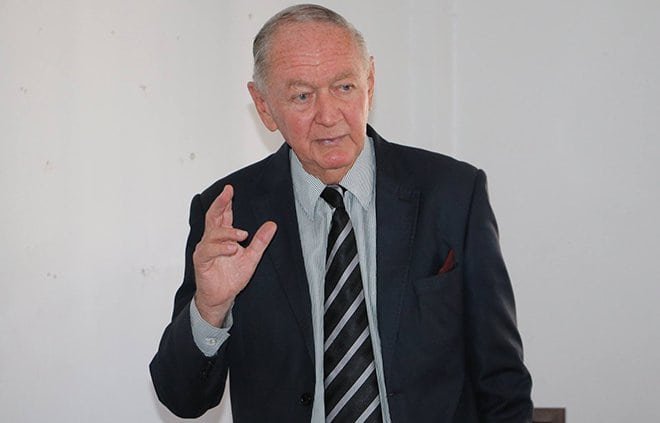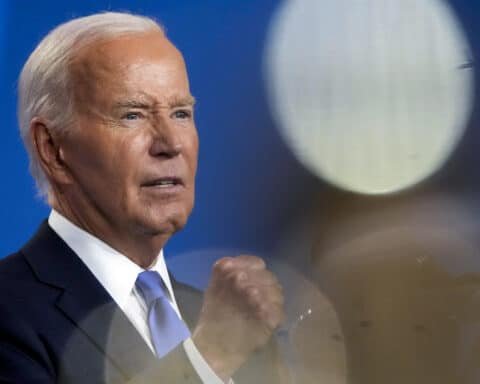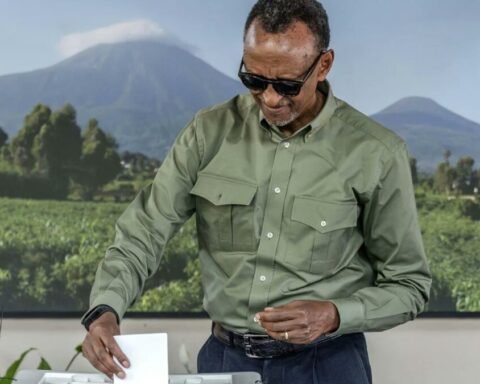Outspoken MDC legislator Eddie Cross has warned that the party’s vice president Thokozani Khupe is likely to face disciplinary action if she continues to oppose Nelson Chamisa, who was recently endorsed as the party’s acting president.
Khupe is at loggerheads with pro-Chamisa officials in the MDC over the opposition party’s leadership, and has since declared that she will not recognise his ascendency to power, declaring herself the acting president by virtue of being the only elected vice president unlike Chamisa and his counterpart Elias Mudzuri, who were both appointed by the late Morgan Tsvangirai.
Cross — also MDC policy coordinator general — told Southern News that it was clear Khupe was fighting a losing battle, hence she needed to reform for the purposes of unity in the party.
“The support for Chamisa is overwhelming,” he said.
“That is over. If Khupe persists she may be disciplined or lose her membership. All other leaders have accepted the inevitable,” Cross said.
The Bulawayo South MP dismissed the notion that the current leadership squabbles in the party will have an effect on the electorate come election time.
“It only affects the standing committee, at the grass roots there is almost complete support,” he said.
Cross also dismissed another widely held belief that Khupe was influential in the Matabeleland region, hence there was need to treat her issue with care.
“That is nonsense — she (Khupe) is delusional,” Cross curtly said.
Turning to the forthcoming election, Cross said President Emmerson Mnangagwa will face a tough election opponent in the name of Chamisa.
He said Mnangagwa has to fulfil his promises he made to the people upon his inauguration or risk facing a humiliating defeat.
“I think ED (Mnangagwa) has a real battle on his hands and will struggle against Chamisa. An upset is very possible especially if ED is unable to deliver.”
Cross has a reputation of being open-minded and forthright, which has earned him friends and foes alike.
Last year, he escaped disciplinary action by a whisker after he openly spoke about Tsvangirai’s health, which conservative members of the MDC felt was too intrusive.
Efforts to get Khupe’s comment were unsuccessful as her personal assistant, Witness Dube, did not respond to messages.
Donkey abattoir: An investment that never was
LAST October, the news of a donkey abattoir opening here sent tongues wagging and elicited mixed feelings from a cross-section of society.
It sounded bizarre to Zimbabweans, to whom donkey meat is taboo and could never make it to the plate.
While a few seemed to support the idea, many, including animal welfare groups and culturists, were fiercely against it.
It’s unheard of, they argued.
Two major fears were outstanding from those who frowned against the idea — the possibility of donkey meat permeating into local butcheries and the likelihood of an increase in donkey thefts.
So deafening was the noise in reaction to the initiative.
Not only did it attract the attention of politicians but the international community too.
But four months down the line, the noise and the anxiety about the donkey slaughtering business — spearheaded by Battlefront Investments located in Manningdale in Umguza district — seems to have died down.
Not many are still talking about the matter on the streets of Bulawayo, as had become the case during the days when the news broke out.
The government and other concerned stakeholders have apparently stalled work at the much-publicised abattoir.
Since the abattoir was built, the owner, Gareth Lumsden, has bought a number of donkeys, on stand-by for slaughter as soon as a licence was secured.
The donkeys had reportedly been bought from surrounding areas of Tsholotsho, Nkayi and Kezi, among others.
Last December, the department of Livestock and Veterinary Services (DLVS) made the announcement that the Zimbabwe National Society for the Prevention of Cruelty to Animals (SPCA) said it had put down over 10 donkeys that were facing the guillotine at the facility.
Bulawayo SPCA veterinary surgeon Anele Dube noted that the donkeys, which were being kept at a feedlot at Manningdale, were killed after the animal welfare organisation realised they were in a bad health state.
This followed a visit by the SPCA and Veterinarians for Animal Welfare Zimbabwe (VAWZ) officials who recommended that the animals be euthanised.
After visiting the abattoir this week, Southern News witnessed a sorry sight of the project that seemed abandoned.
Hopeless as it might have looked, the project owner, however, remains confident that things will turn around.
But if anything, he admits that politics have dealt a major blow to his project.
“It’s all political,” says Lumsden, as he refuses to grant this paper an interview.
“There are too many parties involved. But for now, I will reserve my comments. I will speak at the right time. I will call you guys for a press conference at the right time,” he said grudgingly.
From the short conversation, it could be sensed that Lumsden is a man who now has developed a strong mistrust of journalists following reportage about him and his project.
It was clear he blames the media for having a hand in suffocating his dream. A successful farmer and businessman, Lumsden is no newcomer in the slaughtering business.
He also runs a goat and sheep abattoir.
During the visit, the Southern News crew, found all donkey pens empty, but a quick inquiry from some farm workers indicated that only 25 donkeys which had been taken out for grazing at the nearby grazing land are currently being kept.
After setting up the donkey abattoir, the company intended to export the meat and hides to China where they are in high demand, especially the latter, which is used to produce a traditional Chinese product called ejiao.
The company had already started building the $150 000 state-of-the-art donkey abattoir, with capacity to dress more than 70 animals daily.
The opening of the abattoir in the city was meant to take advantage of the closure of the donkey abattoir in neighbouring Botswana, where donkey meat is a delicacy.
Botswana suspended export licences for the animal products mid last year after villagers had complained that they were losing their donkeys to thieves who were cashing in on the animals.
Fight over 105-year shop lease
A HILLSIDE businessman — Marshal Joseph Stuart — who was awarded a 105-year lease for a shop is embroiled in a fierce battle with his landlord who is frantically trying to evict him regardless of the agreement.
Stuart has been entangled in a battle with shop owner Elexandros Maroukis for the past 19 years.
The shop, which is part of the double storey Old Mutual building owned by Maroukis, is situated at the Hillside Shopping Centre in Bulawayo.
So nasty has been the dispute that on several occasions the matter has been in and out of the courts ostensibly because Maroukis has been withdrawing the case before full trial.
Last week, Maroukis revived the court battle to take over the shop, which Stuart has turned into a clothing outlet over the years.
Recently, Stuart — a man of mixed race — expressed pain at how his landlord has been behaving in the past decade, accusing him of trying to evict him to make way for a white tenant.
“I occupied the shop in 2006, when everybody including the white community was abandoning this business complex due to economic challenges,” Stuart told Southern News.
“But I remained steadfast and pulled through and that’s when Maroukis offered me a 105-year lease for this shop. It’s something that is on record, we both signed and made an agreement and the original copy is with the lawyers,” he said.
But Maroukis has starkly turned against Stuart, accusing him of forging the bizarrely long lease. This has become his basis in the latest court application.
According to a July, 17, 2012 letter by Stuart’s lawyers — Majoko and Majoko Legal Practitioners — to Maroukis, the lease runs up to 2112.
“By lease agreement entered into on the March 21, 2007, you leased out and our client took on lease the premises above mentioned. The lease was to terminate on the April 1, 2112.”
“Surprisingly, through your agents Ken Estate Agents, you denied there was a lease and suggested that if our client produced one it was a forgery. The allegation was malicious, scandalous and defamatory of our client…,” reads the letter in part.
The lawyers also declared that Stuart was not vacating the shop.
“Our client will not vacate the shop for as long as he requires its use and observes the terms of the lease.”
In his response, Maroukis questioned the authenticity of the lease.
“You shall undoubtedly note that on the mentioned lease all numerical 2’s are almost identical yet the latter being the 105-year extension seems to be completely different to all others,” Maroukis argued.
“Does this not pose a question with respect to its authenticity? I put it to you that it appears to be an addition to the contract and did not form part of the so-called agreement,” he queried.
However, as part of forcing Stuart out of the premises, Maroukis has allegedly been using a “scotched earth policy”.
“The shop is now in bad shape but the owner has warned me against renovating it. He blocked the water supply, there is no electricity and I don’t even have electricity. The roof is leaking when it’s raining.
“He even tried to double the rentals but I refused since there was no justification. All these have been clear tactics to move me out of this place but I told him that I can’t move away, I have a long running lease,” Stuart said.
“The reason why he keeps renewing court cases that he never pursues is that they want to suffocate me financially.
Dark cloud as Gukurahundi victims are remembered
WHILE there was bliss after police cleared the memorial of Gukurahundi victims, there was palpable grief as dozens of aggrieved family members gathered for the event at Bhalagwe, Matabeleland South.
Bhalagwe is known as the place where thousands of innocent civilians were thrown into an abandoned mine shaft at the height of the internationally condemned post-independence atrocity, which human rights groups estimate it claimed more than 20 000 lives.
For radical pressure group, Ibhetshu Likazulu, it was a second return at the place after the first attempt in October last year was blocked by riot police under deposed president Robert Mugabe’s rule.
This time, the group organised the event to coincide with Mugabe’s birthday, as part of expressing their disdain to the person seen as the Gukurahundi architect.
While speaker after speaker spoke agonisingly of the sad past, villagers who were also part of the meeting could not hide their anguish at the way the Zanu PF government has disregarded them, despite all the persecution they went through during and after the atrocities.
One elderly Nicholas Dube took a swipe at Zanu PF for declaring Bhalagwe a district heroes acre, which he said it further showed lack of remorse for the mass killings.
“Now they have made this place where the bones of our people are buried in shallow graves their heroes acre, they want to exterminate history that all our children remember will be their heroes lying here not our fellow countrymen that were massacred,” Dube said.
Notably, at that place which has been turned into a heroes’ acre there are two mass graves, where reburials are said to have been done years back.
It is, however, the failure by those who built the huge tomb to indicate that it was a Gukurahundi mass grave that seemed to irk the organisers of the commemoration.
Only the words “Mass Grave” are inscribed on the tomb.
Dube went on to say it should not be forgotten that the purpose of Gukurahundi was not only to eliminate lives but the culture of the region as the two camps that were set in Bhalagwe by the North Korea-trained Fifth brigade were built on the territory that was preserved for rainmaking ceremonies and religious rituals by the community.
As part of the commemorations, candles were lit while they sang the old national anthem Nkosi sikelela, and prayers made after which solidarity speeches were made.








